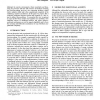430 search results - page 13 / 86 » The Importance of Representing Cognitive Processes in Multi-... |
CSE
2009
IEEE
15 years 7 months ago
2009
IEEE
—We describe a semantic imitation model of social tagging that integrates formal representations of semantics and a stochastic tag choice process to explain and predict emergent ...
ECAI
2004
Springer
15 years 5 months ago
2004
Springer
Abstract. In concrete environments, where uncertainty and dynamism are pervasive and time and resources are limited, reasoning and decision-making processes raise important problem...
116
Voted
SAC
2002
ACM
15 years 2 days ago
2002
ACM
Designing realistic multi-agent systems is a complex process, which involves specifying not only the functionality of individual agents, but also the authority relationships and l...
110
Voted
COSIT
1999
Springer
15 years 4 months ago
1999
Springer
Previous recent research on human wayfinding has focused primarily on mental representations rather than processes of wayfinding. This paper presents a formal model of some aspect...
117
Voted
AAAI
2008
15 years 2 months ago
2008
This paper examines, by argument, the dynamics of sequences of behavioural choices made, when non-cooperative restricted-memory agents learn in partially observable stochastic gam...

